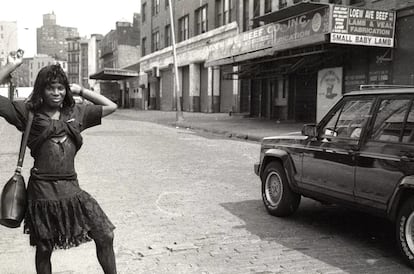The trans prostitutes who were expelled to create an upscale Manhattan (or the other sex in the city)
The memory of the women portrayed in the documentary ‘The Stroll’ was swept away and replaced by the tourist routes in Sarah Jessica Parker’s series


The premiere of the second season of And Just Like That, the sequel to Sex and the City, on HBO coincided with the release of the documentary The Stroll, which portrays the lives of trans prostitutes in New York’s old Meatpacking District. More than anyone else, they’ve experienced the transformation of a neighborhood that symbolizes the ravages of the gentrification of Manhattan, which has replaced their memory with tourist routes from the series starring Sarah Jessica Parker and friends.
The Stroll is not a great documentary, but it tells a very interesting story about an extremely vulnerable community—made up primarily of black trans women—that was wiped off the map with the initiatives to clean up the city undertaken by Mayors Rudy Giuliani and Mike Bloomberg. It’s not a matter of longing for Manhattan and its colorful lumpenproletariat, but embarrassment and shame of the New York portrayed in And Just Like That that makes one want to return to the rough-and-tumble city of The Stroll.
Perhaps because the Sex and the City sequel focuses on women my own age, I find it especially intolerable that it depicts us as bimbos who only dream of going to the Met Gala. The whole thing is irritating, even disturbing. Who is this show’s potential audience? Young women who dream of having a lot of money and going dressed like cauliflower to the gala of the day, or adults who, fed up with so many handbags, flirt with a new politically correct sex life? Am I the only one who gags at the tidy bedroom scenes?
Sex and the City has always been a pretty prudish series, but now it’s beyond sappy. No one can believe that these new ladies laden with pounds of accessories have lost all their grace, if they ever had it to begin with.3
Although fashion has consumed trans activism and the U.S. is currently experiencing a wave of attacks on the community in the form of Republican Party laws in at least 19 states, The Stroll shows a reality beyond the Meatpacking District’s new stores. Directed by former sex worker Kristen Lovell and Zackary Drucker, the documentary is part of an oral history project—with the participation of the New York Public Library and the Digital Transgender Archive—on trans life in New York that aims to recover the stories of the women who left their lives in the Meatpacking District and the West Village, where Lovell worked as a prostitute until the beginning of the 21st century.
Back then, the area was the underworld of an underworld, populated with stories of teenage girls who had been kicked out of their homes. Forced to live on the streets, they had no choice but to prostitute themselves, the only job trans women were allowed to have until recently. Most of them died along the way, which is why it is so moving to listen to their surviving friends. The stories are terrible: Take Tabytha, for example, who went to prison for five years for dealing drugs and spent 14 years for violence inside the prison. With admirable lucidity, she admits that she became a monster in prison; when she finally got out and returned to the neighborhood, she found only luxury stores and iPhones: “The streets no longer existed.”
Sign up for our weekly newsletter to get more English-language news coverage from EL PAÍS USA Edition
Tu suscripción se está usando en otro dispositivo
¿Quieres añadir otro usuario a tu suscripción?
Si continúas leyendo en este dispositivo, no se podrá leer en el otro.
FlechaTu suscripción se está usando en otro dispositivo y solo puedes acceder a EL PAÍS desde un dispositivo a la vez.
Si quieres compartir tu cuenta, cambia tu suscripción a la modalidad Premium, así podrás añadir otro usuario. Cada uno accederá con su propia cuenta de email, lo que os permitirá personalizar vuestra experiencia en EL PAÍS.
¿Tienes una suscripción de empresa? Accede aquí para contratar más cuentas.
En el caso de no saber quién está usando tu cuenta, te recomendamos cambiar tu contraseña aquí.
Si decides continuar compartiendo tu cuenta, este mensaje se mostrará en tu dispositivo y en el de la otra persona que está usando tu cuenta de forma indefinida, afectando a tu experiencia de lectura. Puedes consultar aquí los términos y condiciones de la suscripción digital.








































